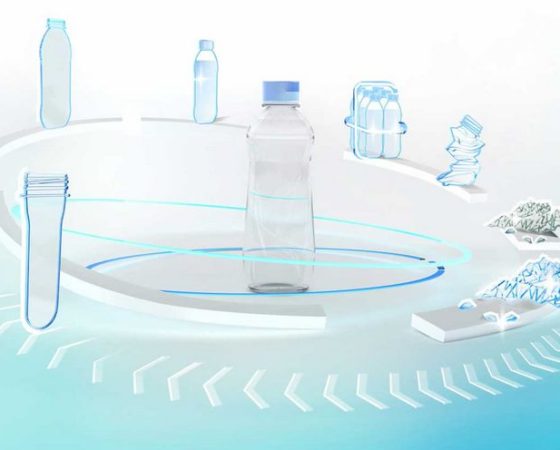Can plastic packages be sustainable? Yes, if they are resource-economically produced and kept in a closed cycle. Krones offers a solution for every step involved in the process. From material-minimised packaging design and energy-economical container production all the way through to the recycling of used plastics. The aim is to achieve a sustainable beverage factory with a closed PET cycle – a vision that’s now within our reach. Because all the building blocks needed are already included in the Krones Group’s portfolio.
For producing the preforms, every tenth of a second in cycle time and every tenth of a gram in weight are vital. There are plenty of potential savings. In order to use them, there are two preconditions: firstly, comprehensive knowledge of the properties and behaviour of the various preform materials; and secondly an in-depth understanding of the production processes involved – both during injection-moulding of the preforms and also when identifying the salient parameters for the stretch blow-moulding function. Based on its innovative hot-channel technology developed in-house, the Krones subsidiary MHT offers a sophisticated high-performance injection-moulding tool that even with a flakes content of over 70 per cent rPET achieves superlative results. In addition, it excels in term of particularly homogeneous temperature control of the melt, and natural balancing.
For the further path of the preform to a saleable product, Krones’ portfolio includes an entire bandwidth of technical solutions.
With the Contiform stretch blow-moulding machines, preforms with a recyclate content of 100 per cent can be handled without any problems at very low energy and compressed-air consumption: Also at high speed. With the Contiform 3 Speed up to 2,750 bottles per cavity and hour can be produced. This version even undercuts by up to 15 per cent the in any case already very low energy and compressed-air consumption of the Contiform 3 Pro.
After the bottles have been filled, they can be innovatively closed using Flip Lid. This closure has been jointly developed by Krones and Aptar. It connects the lid to the bottle, thus preventing plastic waste from entering the natural environment. Commercial availability of Flip Lid is planned as from 2020.
For container decoration, Krones supplies the DecoType Select direct printing system, which offers high colour brilliance on both virgin and rPETt. The resource cycle is not interrupted, since the American Association of Plastic Recyclers has confirmed that the ink involved can be removed in its entirety.
In order to combine eco-friendliness with cost-efficiency for the packaging of beverage bottles, Krones has expanded its enviro sustainability programme to include enviro Design. This means that in future packaging solutions will be scrutinised for their environmental impact, such as greenhouse gas emissions or preserving the eco-system. One of the solutions, for example, is the LitePac packaging option.
In the shape of LitePac, Krones has created a secondary package that consumes up to 90 per cent less energy in the production process and even 70 per cent less waste than shrink-packs.
In order to close the cycle, Krones offers in the shape of MetaPure recovery systems that recycle containers made of PET to make food-grade PET and upcycle polyolefins for higher-quality re-use than hitherto.
forrás:krones.com 2019.10.08

